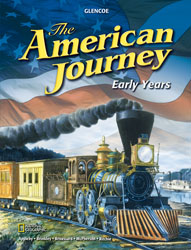
The American Journey Early Years © 2012Chapter 11: The Jackson EraChapter OverviewsSection 1: Jacksonian Democracy The candidates who ran for president in the 1824 election were all from the Republican Party, the country’s only political party at the time. John Quincy Adams won the election, but many believed his tactics were corrupt. By 1828, the Republican Party had split over the issue of how strong the government’s role should be. The two parties used mudslinging and sloganeering in their campaigns. Andrew Jackson won the 1828 election and made the American political system more democratic by expanding voting privileges to those who had not been allowed to vote. Jackson’s supporters also introduced the spoils system and used nominating conventions to select candidates. Section 2: Conflicts Over Land During the 1830s, the nation continued to expand westward. However, many Native American groups were still living in the East, on land that settlers wanted for themselves. Jackson approved the Indian Removal Act that allowed the federal government to pay thousands of Native Americans to move west. The Cherokee, however, sued to keep their land. After years of government pressure, the Cherokee relented and were forced to make the brutal journey west, now called the Trail of Tears. Other Native American groups also attempted to resist relocation. The Seminole people of Florida went to war with the United States, joining forces with African Americans who had escaped slavery. Although they won, many Seminole were caught and forced to move West. After 1842, most Native Americans had been taken from their lands by force and were living on reservations west of the Mississippi. Section 3: Jackson and the Bank For years, Jackson attacked the Bank of the United States because he saw it as an institution that benefited only the wealthy. Before the election of 1832, Jackson vetoed a renewal of the Bank’s charter—a popular decision that helped him win the election. An economic depression began with the Panic of 1837 that left thousands jobless and in debt. To prevent further crises, President Martin Van Buren persuaded Congress to establish an independent federal treasury. Criticisms over the new law created a split in the Democratic Party. The Whigs, a new political party, nominated war hero William Henry Harrison to run in the 1840 presidential election. To win, they needed the support of laborers and farmers. Harrison won the election, but died after soon of pneumonia. Vice President John Tyler took office, but took the presidency in a direction that was opposed to the Whigs’ goals. |  |















